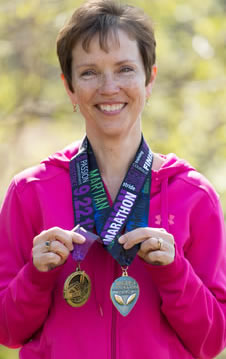When Cancer Comes Back

Photo by Edda Pacifico
Living with advanced cancer and making the most of your future
Jennifer Kelley was unprepared for the rare diagnosis of leiomyosarcoma at age 52, especially since it was her third experience with cancer in a mere 30 months. She had the cancerous lump under her arm surgically removed and followed up with five cycles of chemotherapy as a precaution.
Her U-M oncologist, Scott Schuetze, M.D., Ph.D., is one of the leading sarcoma experts in the United States and the world. Because Kelley's cancer had spread into a lymph node, he explained the cancer was categorized as stage 4 and expected to return.
"The advice I give patients the second time around depends on the situation," he says. "If it is potentially curable, I reassure them that we will try to cure the sarcoma. The other option is to help them live as good a life as possible -- with the sarcoma -- or as long as possible."
"Getting the stage 4 diagnosis was a lot to deal with," says Kelley, now 56, a married mother of two adult children. "I wanted to believe I was OK and could live a long time. It created anxiety and some depression."
She agonized over thoughts of whether and when the sarcoma might return.
"Every patient who comes into the office for a check-up and scans after sarcoma cure is anxious about recurrence. I give results immediately after coming in the room, especially if everything looks fine, to relieve the anxiety," Schuetze says. "A positive attitude and trying to remain as active as possible and live as normal a life as possible go a long way towards helping during treatment for cancer or living with recurrence."

Photo by Edda Pacifico
Strong Body, Strong Mind
Kelley took his words to heart and decided to do what she could to keep her mind and body strong. She continued working at the U-M Credit Union, a job she’s held for 31 years. She attended a program to study Chinese energy, which taught her to distinguish between her positive and negative imagination. Writing small goals and opening her eyes to little gifts during the day (like pretty clouds in the sky) helped her cope with the anxiety of chemotherapy.
Following treatment, she began walking as much as possible to build endurance in the event the leiomyosarcoma came back and she needed to undergo another surgery. When her cancer recurred two years later, it was removed with clear margins and had not spread.
"The important point about treating recurrence for cure is multidisciplinary involvement from the sarcoma team," Schuetze says. He explains that each patient is unique and requires different treatment if cancer comes back. Some, like Kelley, only require surgery. Other patients follow up with chemotherapy or radiation.
Today, Kelley has no evidence of cancer and, with one recurrence under her belt, has trained for and walked two marathons with her daughter, Christine. Last spring, they also jumped out of an airplane, something they always wanted to do. Next on her list is to zip line in Costa Rica.
"If I can make that happen, I will," Kelley says. "I'm trying to get more out of my life since I don't know how long I'll feel good."

Tips for coping with advanced cancer:
- Create a support network or attend a group
- Ask for help from friends and family
- Be educated about your disease and treatment
- Stay hopeful, remembering what you hope for might change
- Don't hesitate to seek emotional support
- Do things that matter most to you
Living with Advanced Cancer
Kelley never lets go of the idea she has cancer. She does not want to let her guard down. However, as she moves forward with no evidence of disease, she is able to focus more on living and less on worrying.
"For anyone who's worrying about recurrence, I would go back to the concept of negative imagination," she says. "Try not to borrow trouble. It hasn't happened. You might have a recurrence, but you might not. I do try to be cognizant of my coping skills so I can deal with it if it happens again."
Rogel Cancer Center Social Worker Jane Deering runs the Living with Advanced Cancer Therapy Group for Women. Patients with metastatic cancer often face sadness, shock and disappointment. The biggest issue is the fear of uncertainty.
"One of the things I tell people is there is no going back to normal. We create a new normal and it can be a good normal," she says. "Part of it is having a place to express those fears, but also finding a way to limit those feelings so you can still enjoy life. It's learning how to manage the uncertainty and anxiety about the future."
Kelley attends the therapy group twice a month at the Rogel Cancer Center. Because she is free of cancer despite her stage 4 diagnosis, she feels she is a source of hope for the group. She also attends art therapy and performs guided imagery, both part of the center's Complementary Therapies Program.
"Some metastatic cancers are treated as a chronic illness that we manage and keep under control," Deering says. "People can get to acceptance. They bring the same set of strengths they used during their initial diagnosis to new challenges of the recurrence."
Kelley joined the therapy group because she wanted to learn from other women how they were getting through their illnesses. Each session, members introduce themselves and provide updates. They often discuss and strategize the things they can and cannot control.
"I have expectations for a bright future," Kelley says. "I don't hesitate to make plans for my future. I'm not anticipating treatment. If it happens, it happens and I'll have to cope with it. I'm prepared."
Download/view the Women with Advanced Cancer Support Group Flyer.
Continue reading the Summer, 2014 issue of Thrive.
